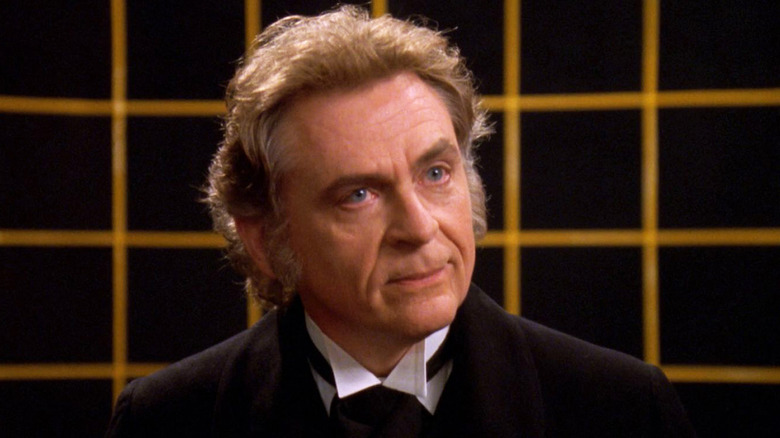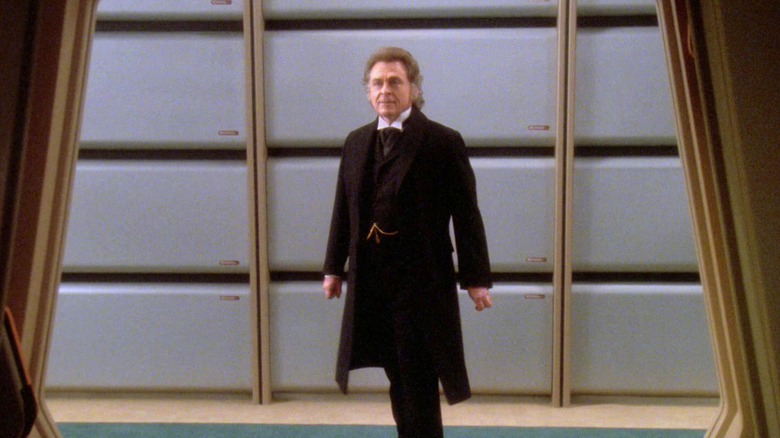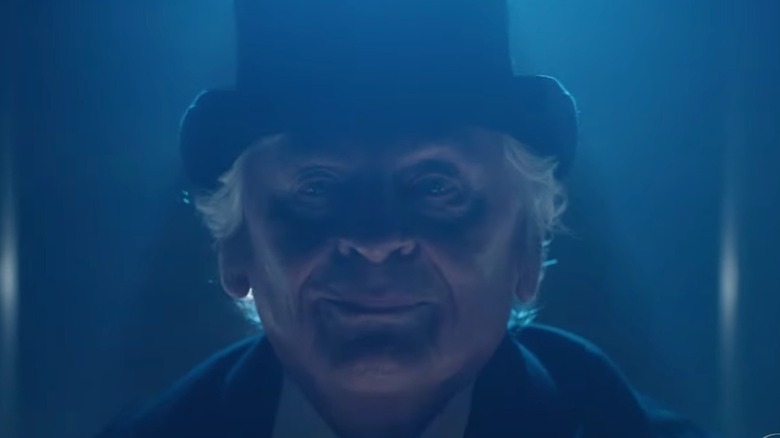Picard Season 3 Brings Back One Of The Next Generation's Silliest Villains
This post contains spoilers for episode 6, season 3 of "Star Trek: Picard."
On the sixth episode of the third season of "Star Trek: Picard" — called "The Bounty" — Worf (Michael Dorn), Raffi (Michelle Hurd), and Capt. Riker (Jonathan Frakes) break into a space-bound, top-secret Federation storage warehouse called Daystrom station. On board, the characters find a lot of shadowy corridors lined with lockers containing strange "Star Trek"-related artifacts. In one locker, Worf discovers a living tribble, only this one is equipped with fangs and a sucker mouth. In another, Raffi finds the remains of Capt. Kirk, presumably retrieved from under a pile of rocks on Veridian III. The references rest on the border of cute and insufferable, and the episode as a whole leans far too hard into nostalgic temptation.
Case in point: Daystrom station is equipped with an artificially intelligent security system that recognizes Riker and Worf and immediately initiates a holographic security countermeasure. Ignoring for a moment that a mere storage warehouse is equipped with sophisticated holo-emitters, Riker, Worf, and Raffi find themselves facing off against none other than Moriarty (Daniel Davis), the nemesis of Sherlock Holmes as he appeared in Arthur Conan Doyle's 1893 short story, "The Final Problem." Raffi is baffled that a holographic villain from the 19th century is guarding a Federation black site in the 25th, especially when only armed with an old-fashioned pistol.
Moriarty's presence on "Picard" is a little perplexing, but it was perhaps no more perplexing than his two previous appearances on "Star Trek: The Next Generation" where Moriarty, as a hologram, achieved consciousness and attempted to take over the Enterprise.
Ship in a bottle
Moriarty, as played by Daniel Davis, first appeared in the episode "Elementary, Dear Data" (December 5, 1988). In that episode, Data (Brent Spiner) had become too good at solving Sherlock Holmes mysteries on the holodeck, making the deduction and investigation parts of the stories — the fun parts — unnecessary. Geordi (LeVar Burton), bored in his role as Dr. Watson, suggested to Data that he needed to be challenged by a mystery, and asked the holodeck to create a character that would actually be capable of besting Data. Note that Geordi said "Data" and not "Sherlock Holmes." The holodeck, using heretofore unknown powers, created a Prof. Moriarty that is self-aware. Moriarty knows he is a citizen of 19th-century England but also finds himself able to access the Enterprise's computers, slowly becoming aware that he is a mere character in a high-tech simulation. He will eventually try to gain control of the ship.
It will take a great deal of negotiation from Picard to convince him to stop his shenanigans. Moriarty is stored in the ship's memory to be dealt with at a later time. He will be restored accidentally in the episode "Ship in a Bottle" (January 24, 1993) where he will announce he was aware of the passage of time, even when stored in a memory bank. Once again, he will attempt to take over the Enterprise. At the end of the episode, Moriarty is duped into a simulation, and he is placed into a computerized cube that will provide him and his beloved wife with a lifetime of adventures.
How is Moriarty here?
One can see why "Star Trek" writers are drawn to Moriarty. Like the denizens of the Enterprise, he is an intellectual. And like all life forms on "Star Trek," he demands respect and autonomy; when Picard is confronted with a new life form, he initially balks, unsure how to deal with the fact that his ship spontaneously created an adult human being. Moriarty is a character from classic Western literature, a canon that Trek is fairly obsessed with. Additionally, visiting Doyle's England provides "The Next Generation" with some much-needed visual variety; one can only look at grey-and-lavender hallways for so long before aching for dark earth tones.
As a villain, though, Moriarty does possess a palpable fatuity. While the dramatic explanation for the character is laid out in detail, his actual presence on "Star Trek" feels a little like, say, Mr. Peabody and Sherman visiting Cleopatra. Author Loren D. Estleman once wrote a novel called "Sherlock Holmes vs. Dracula." "Moriarty vs. Picard" tilts away from "essay on the nature of consciousness" pretty quickly, and falls headlong into the realm of Estleman-like fan fiction.
Moriarty's presence on "Picard" is, quite disappointingly, presented bluntly and without reason, making the character only that much more absurd. As a security device, Moriarty fires bullets at Worf, Raffi, and Riker, while also psychically playing noisy, isolated musical chords through the station's sound system. Riker eventually intuits that the notes being played are from "Pop Goes the Weasel," a tune he once whistled for Data in the "Next Generation" pilot episode.
Riker also realizes this version of Moriarty is not the same one as before, and is actually a manifestation of Data's consciousness (!). Data is alive and nearby (!!).
It's an unfortunately silly twist that doesn't do anything to allay the character's inherent silliness.


